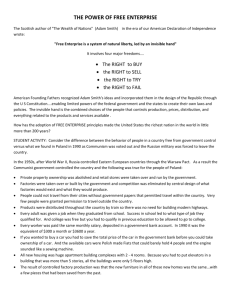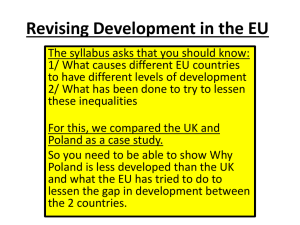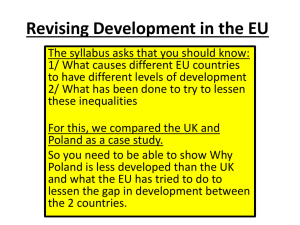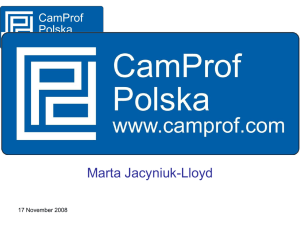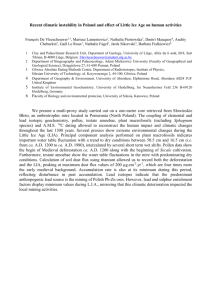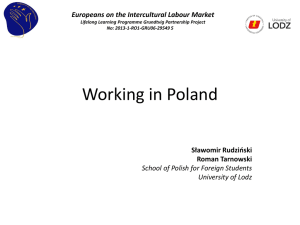GEN - Miur
advertisement
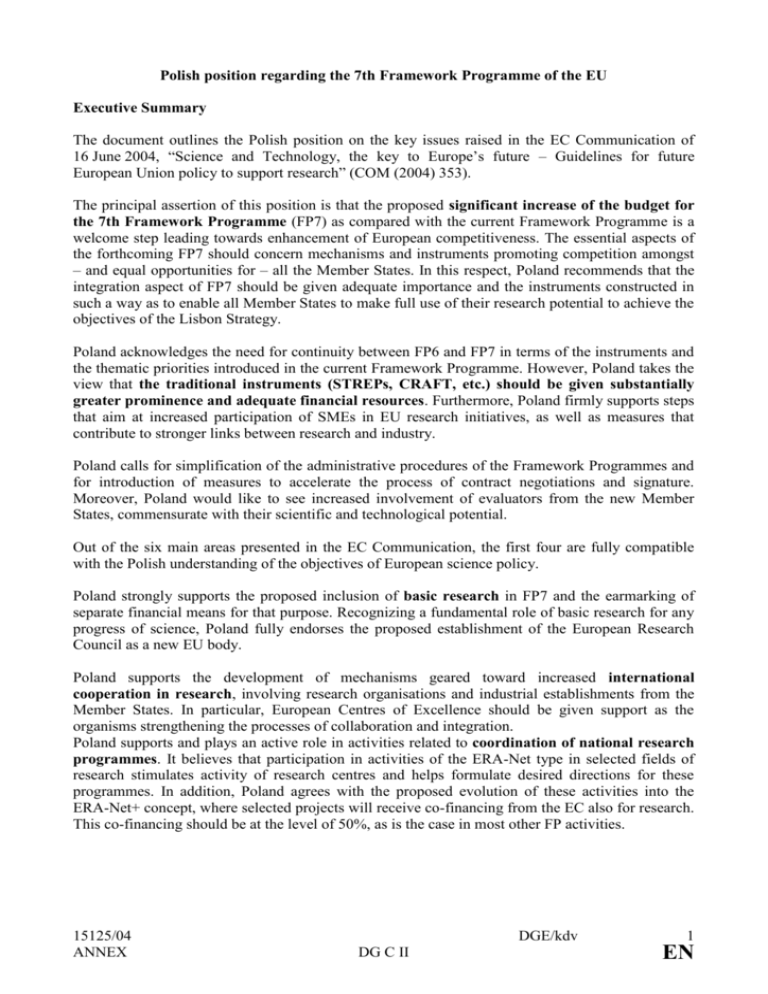
Polish position regarding the 7th Framework Programme of the EU Executive Summary The document outlines the Polish position on the key issues raised in the EC Communication of 16 June 2004, “Science and Technology, the key to Europe’s future – Guidelines for future European Union policy to support research” (COM (2004) 353). The principal assertion of this position is that the proposed significant increase of the budget for the 7th Framework Programme (FP7) as compared with the current Framework Programme is a welcome step leading towards enhancement of European competitiveness. The essential aspects of the forthcoming FP7 should concern mechanisms and instruments promoting competition amongst – and equal opportunities for – all the Member States. In this respect, Poland recommends that the integration aspect of FP7 should be given adequate importance and the instruments constructed in such a way as to enable all Member States to make full use of their research potential to achieve the objectives of the Lisbon Strategy. Poland acknowledges the need for continuity between FP6 and FP7 in terms of the instruments and the thematic priorities introduced in the current Framework Programme. However, Poland takes the view that the traditional instruments (STREPs, CRAFT, etc.) should be given substantially greater prominence and adequate financial resources. Furthermore, Poland firmly supports steps that aim at increased participation of SMEs in EU research initiatives, as well as measures that contribute to stronger links between research and industry. Poland calls for simplification of the administrative procedures of the Framework Programmes and for introduction of measures to accelerate the process of contract negotiations and signature. Moreover, Poland would like to see increased involvement of evaluators from the new Member States, commensurate with their scientific and technological potential. Out of the six main areas presented in the EC Communication, the first four are fully compatible with the Polish understanding of the objectives of European science policy. Poland strongly supports the proposed inclusion of basic research in FP7 and the earmarking of separate financial means for that purpose. Recognizing a fundamental role of basic research for any progress of science, Poland fully endorses the proposed establishment of the European Research Council as a new EU body. Poland supports the development of mechanisms geared toward increased international cooperation in research, involving research organisations and industrial establishments from the Member States. In particular, European Centres of Excellence should be given support as the organisms strengthening the processes of collaboration and integration. Poland supports and plays an active role in activities related to coordination of national research programmes. It believes that participation in activities of the ERA-Net type in selected fields of research stimulates activity of research centres and helps formulate desired directions for these programmes. In addition, Poland agrees with the proposed evolution of these activities into the ERA-Net+ concept, where selected projects will receive co-financing from the EC also for research. This co-financing should be at the level of 50%, as is the case in most other FP activities. 15125/04 ANNEX DGE/kdv DG C II 1 EN Poland supports the European Union’s mobility policy and stipulates increased assistance for the best researchers and the creation of highly attractive conditions for their work in Europe. In this respect, Poland would like to see raised expenditure on reintegration grants, and strengthened promotional efforts aimed at eliciting greater interest in a scientific career. Such measures, coupled with making a career in research more attractive, could promote balanced “brain circulation”. Furthermore, Poland firmly believes that, in line with these policies, hourly rates for researchers from the new Member States, at present well below those awarded under Framework Programmes to researchers from highly developed countries, should be considerably increased. With respect to the two remaining areas, Poland’s stance remains cautious. The development of infrastructure is considered in the Communication as one of the main pillars of FP7. Poland shares this approach, provided that the related financing creates European added value and strengthens European competitiveness also through the integration of the considerable human potential of less-developed Member States. The development of research infrastructure in those countries will allow for full utilisation of their research potential in the establishment of the European Research Area. The demand for large research facilities in Central and Eastern Europe should be taken into account, just as the need for a long-term strategy for international access to them. Poland is prepared to use the EU Structural Funds as a source of financing complementary both to national funding and to the funding from the Framework Programme. In that respect, Poland welcomes the intention to establish a new priority in the allocation of the Structural Funds after the year 2006, namely “Research and Innovation”. Poland welcomes the initiatives to create the European Technology Platforms, particularly in the areas of advanced technology. However, Poland stipulates that the lists and topics of the Platforms remain open so that existing and future national technological initiatives of significant potential can reach the European scale. Poland recognises the need for the introduction into FP7 of new research areas, such as securityrelated and space research. However, Poland proposes the allocation of separate funds to these activities, in order to preserve adequate clarity. Concerned with a lack of sufficient scientific support for solving social and environmental problems on the global and local scales, Poland would like to propose the creation of a new scheme, named provisionally the European Social and Environmental Initiatives. These Initiatives would be concerned with the establishment of structures with sufficient critical mass to formulate research programmes, particularly interdisciplinary ones, in human, social and environmental sciences, and to provide adequate financial support for them. The key stakeholders in these Initiatives would be academia (as the beneficiary of the related funding), local governments and non-governmental organisations, involved in activities for sustainable growth. In conclusion, Poland wishes to express its conviction that the Communication of the Commission constitutes a good basis for creating and realising the EU science and technology policy for the years to come. The document should contribute to the strengthening and integrating of European science. _______________ 15125/04 ANNEX DGE/kdv DG C II 2 EN

